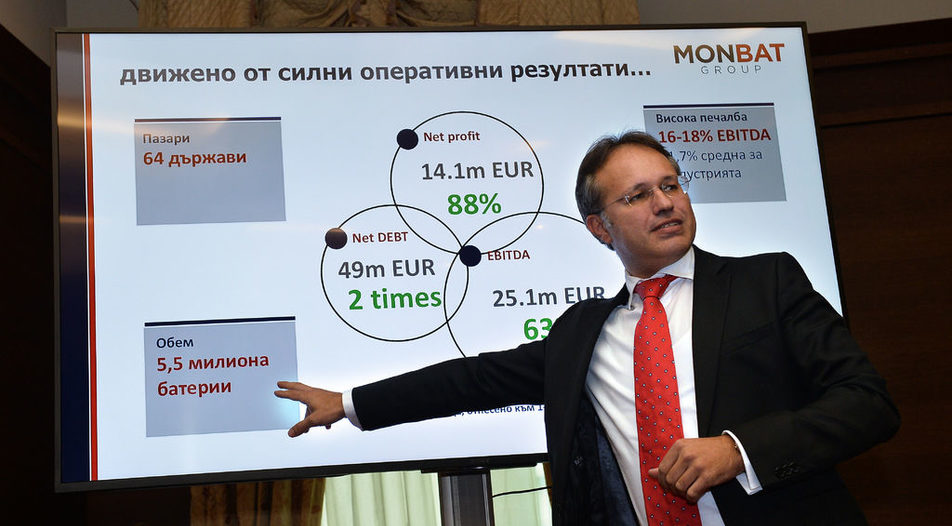Monbat is the only Bulgarian company to have undertaken three acquisitions and planning a fourth one within just a few months, all of them abroad. Earlier this year, the Bulgarian manufacturer of lead-acid batteries announced it was buying two German companies, Gaia and EAS. Only a few months ago, Mombat acquired Piombifera, an Italian recycler of lead-acid batteries. Currently, Mombat is preparing a bid to take over Tunisian battery manufacturer Assad. The prices of each of these takeovers have not yet been announced.
While Piomifera and Assad are close fits with Mombat's traditional business line. The two German acquisitions develop new lithium-ion technology and have small scale production, a new area for the Bulgarian company. Monbat executives note that the decision to buy Gaia and EAS was a strategic, aimed at keeping Mombat responsive to the new market trends.
50-year horizon
Mombat's purchase of Gaia and EAS was also part of its development program for the coming fifty years. "We realized that 30 to50 years will see a change in the ratio of lithium-ion and conventional batteries," according to Monbat's executive director Petar Bozadzhiev, who will also oversee the lithium-ion battery development.
"Many large companies fail because they associate themselves with technologies rather than with the uses thereof. So, we chose to continue with power and energy but not to be sentimental about lead."
German technology
Monbat sees potential applications of the lithium-ion technology in two key areas: high power, which is used in industry, and batteries for hybrid trucks and buses. The technology employed by two German companies is relevant to both these applications.
In the 21 years since its founding, Gaia has developed cylindrical power cells based on Lithium Iron Phosphate (LFP) chemistry, reliable technology with cells that are resistant to pressure. In addition, LFP is not explosive. Such reliability and safety open the doors to applications in road vehicles, trains, submarines, and other conveyances.
During its two decades of operation Gaia had commenced but not completed R&D projects in a number of areas. Referring to such projects, Bozdzhiev noted that " the issue was not technological, nor was it product product-related. Gaia had simply started many development projects with a long certification cycles and exhausted its resources before the projects could reach commercialization,"
Monbat's other German-based acquisition, EAS, was originally a spin-off from Gaia that had been sold to US-based Enersys. Enersys, a large-scale producer of conventional batteries that once produced high-capacity submarines batteries for in Bulgaria), had also considered developing products utilizing lithium-ion technology. Enersys later abandoned its plan and subsequently sold EAS. Like Gaia, EAS and its subsequent owner lacked sufficient resources to pursue their plans. Both companies later went into liquidation. Monbat stepped into the breach and bought them from the liquidators for as Mr. Bozadzhiev put it: " on a quite a reasonable price."
Step-by-step
Currently, Monbat is merging its German acquisitions and has established Monbat Holding GmbH as a financing and managing structure. The new holding structure will control two companies: MNP owns the assets, while EAS Batteries is operative company, which employs around 30 people and which will be a development center and a small production facility. The business model, however, will be changed completely. The company will focus on LFP only (Gaia also has another chemistry developed) and on three types of cells that can be combined into alternative modules and configurations.
The first product range of Monbat's new German acquisition, EasyBatteries (including products EasyMarine, EasyBus and EasyRailway), will begin to be marketed step by step in the last quarter of 2018. In the meantime EAS will be working on a new generation of cells (EasyHybrids), which will be commercialized in the middle of 2019. The gradual introduction of new products will allow EAS to determine its strategy and if it has market success to invest in new production facility, the managers say.
Conventional growth
Monbat's acquisition in Italy and potential acquisition in Tunisia are connected with its core business: production and recycling of lead-acid batteries.
The acquisition of Piombifera, one of the three largest recycling companies in Italy, is expected to improve Monbat's access to lead supplies as well as creating an additional high-value-added business in and of itself. Piombifera had been a loss-making company and, in Bozadzhiev's words, other conditions being equal buying it would not have made sense. Monbat's interest was in the Italian company's license to collect waste batteries, a path for securing raw materials essential to Monbat's own growth. The access to more recycled batteries will also allow Monbat to create additional businesses: processing and production of tin and antimony, which have a much higher added value.
The possible purchase of Tunisian conventional battery manufacturer Assad, now under due diligence by Monbat, would provide the Bulgarian battery group with access to the promising markets in African market.
Monbat is the only Bulgarian company to have undertaken three acquisitions and planning a fourth one within just a few months, all of them abroad. Earlier this year, the Bulgarian manufacturer of lead-acid batteries announced it was buying two German companies, Gaia and EAS. Only a few months ago, Mombat acquired Piombifera, an Italian recycler of lead-acid batteries. Currently, Mombat is preparing a bid to take over Tunisian battery manufacturer Assad. The prices of each of these takeovers have not yet been announced.
While Piomifera and Assad are close fits with Mombat's traditional business line. The two German acquisitions develop new lithium-ion technology and have small scale production, a new area for the Bulgarian company. Monbat executives note that the decision to buy Gaia and EAS was a strategic, aimed at keeping Mombat responsive to the new market trends.












